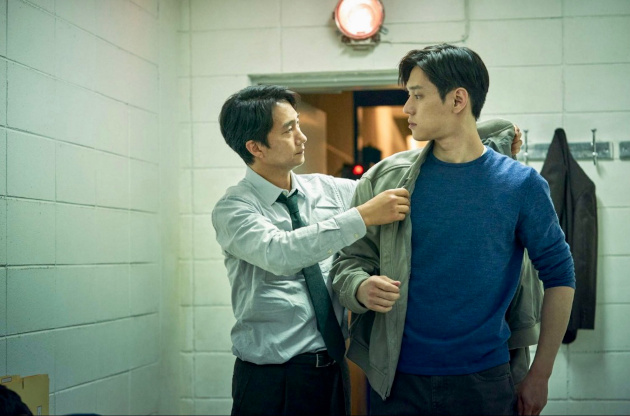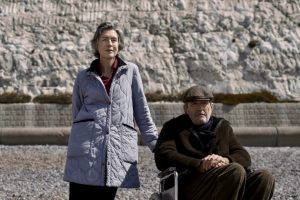If there is one thing to expect from South Korean director Park Chan-wook, it’s the unexpected. From The Vengeance Trilogy, Thirst (2009), Stoker (2013), and The Handmaiden (2016), Park is a master of keeping us on our toes. Even when we have a familiarity with his set up, he has a knack for twisting things in offbeat ways. His latest effort, Decision to Leave (2022) follows this pattern. When compared to his previous work, it stands as a more straightforward story. Sure, there are surprises, and it is certainly not lacking in intrigue, but those looking for the shock value of Oldboy (2003) won’t get it here. Instead, the tension is more internal – a battle between doing the right thing and falling for temptation.
Co-written by Park and Seo-kyeong Jeong, the narrative takes the form of a traditional noir mystery. Hae-jun (Park Hae-il) is a detective suffering from insomnia. His latest case involves the death of a businessman who flung themselves off the top of a mountain. Hae-jun’s investigation leads him toward the businessman’s much younger widow: a Chinese woman named Seo-rae (Tang Wei). The relationship Seo-rae had with her late husband, as well as the curious circumstances of his death, causes Hae-jun to narrow his focus toward her. The more he learns about Seo-rae and her background, the more he believes she knows something but isn’t saying. Despite the urging of his partner Soo-wan (Go Kyung-Pyo) to bring her in, Hae-jun turns the investigation into his own personal obsession.

From the start, the writing and direction make references to the past, specifically the thrillers of Alfred Hitchcock. Hae-jun’s increasing fascination with Seo-rae, along with the truth of her identity, will undoubtably remind some viewers of Vertigo (1958). The comparison is not subtle. Ji-yong Kim’s cinematography includes several visual callbacks to Hitchcock’s classic film, including (but not limited to) extended driving sequences where the protagonist follows his suspect, passionate exchanges atop a precipice, a constant shifting of perspectives and motivations, etc. This all creates an air of uncertainty. At times, we are made to believe that we are seeing events through one person’s eyes, only to realize that it was someone else. The further along we go, the more labyrinthine the mystery becomes, but not in a bad way. The enjoyment is seeing the characters influence and succumb to the intricacies of the plot. It’s a tantalizing affair in which the narrative keeps us guessing from start to finish.
This sense of ambiguity – involving the balance between Hae-jun’s duty as an officer and his desire to learn everything about Seo-rae – is reflected in motifs involving vision, communication, and human interaction. The fact that Hae-jun has trouble sleeping and must use eyedrops signifies not just his physical condition but also his mental acuity. When he goes on a stake out and watches Seo-rae through binoculars, he envisions himself in the room with her, sometimes even speaking her words. When the two try to have a conversation, the language barrier forces them to use a translation app on their phones. Slowly but surely, Hae-jun inserts himself into the case – not as a detached observer but an active participant. During scenes of Seo-rae detailing her past and her relationship with her husband, Hae-jun is transported into the flashback as though he were witnessing everything in person. Sometimes, scenes will cut not just in the middle of a conversation, but in the middle of a sentence. Despite being a full two and half hours, the narrative never allows us to catch our bearings.
It also helps that Decision to Leave is quite funny. Although we have a story involving death, lies, and double crosses, there are instances where Park dives into darkly comic scenarios. A foot chase up a steep incline has characters huffing and puffing as they pursue a suspect. By the time they all reach the top, neither side has the energy to put up much of a fight. Soo-wan plays the comic foil to Hae-jun, providing an opinion unclouded by Seo-rae’s aura. Go Kyung-Pyo’s leans into the character’s exasperation, going for broad physical comedy that somehow fits the overall tone. Early on, when Hae-jun and Soo-wan investigate the circumstances of the dead businessman, they take a rope and climb up the side of the mountain. With pitch perfect delivery, Soo-wan points us that they could have easily walked around the other side instead of taking the hardest path possible. Go Kyung-Pyo steals many of the scenes he is in – it would be interesting to see the investigation entirely from his point of view.

There comes a time in any Park Chan-wook film where he throws a wrench into the proceedings, changing the way we see the characters and how they view each other. The moment definitely comes here, but it doesn’t hit as hard as his previous work. The introduction of yet another mystery complicates matters, making an already messy situation more confusing. The sleek direction, hypnotic production design, and compelling performances keep everything together, but once we step back and look at the big picture, we wonder if the individual pieces work better than as one complete whole. Those that are interested in plot coherency may find difficulty with the multiple tangents and red herrings, because that is not what Park is aiming for. Instead, this is a puzzle that washes over us, where mood and atmosphere take precedence over narrative structure.
Decision to Leave leaves a heavier impact when viewed at night. With its dreamlike qualities, shifting allegiances, and questionable characters, the film never spoon feeds us easy answers. Everything sits just outside of arm’s reach, so that we must work to meet the narrative on its own level. It doesn’t just encourage a rewatch, it almost demands it. That’s when you know you are in the hands of a good movie – instead of being a passive viewer you get caught up in the suspense and drama, just like the characters.



